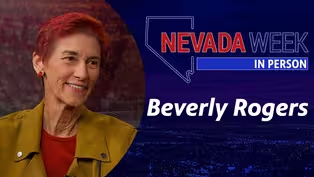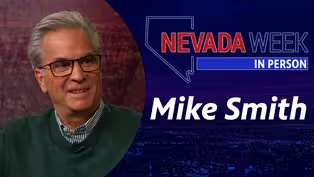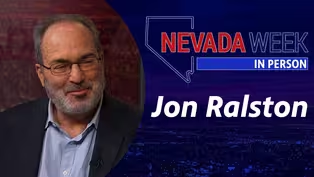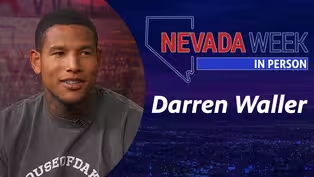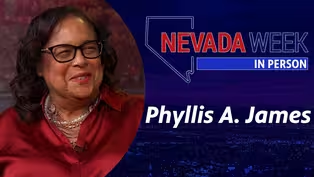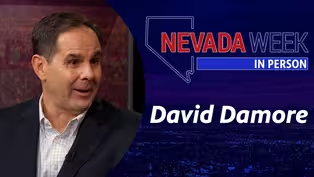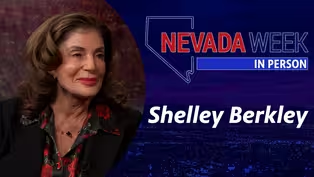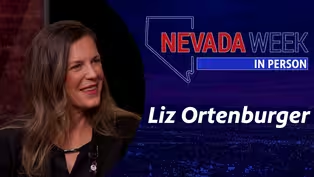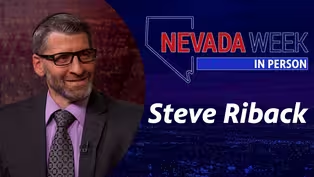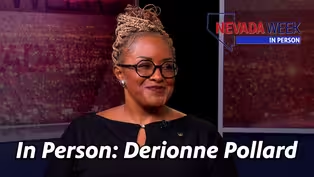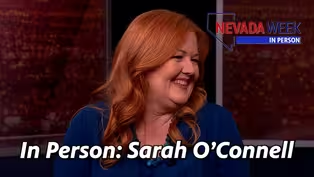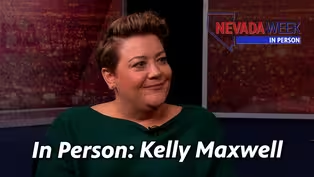
Nevada Week In Person | Walter Panzirer
Season 1 Episode 40 | 14mVideo has Closed Captions
One-on-one interview Walter Panzirer.
One-on-one interview Walter Panzirer.
Problems playing video? | Closed Captioning Feedback
Problems playing video? | Closed Captioning Feedback
Nevada Week In Person is a local public television program presented by Vegas PBS

Nevada Week In Person | Walter Panzirer
Season 1 Episode 40 | 14mVideo has Closed Captions
One-on-one interview Walter Panzirer.
Problems playing video? | Closed Captioning Feedback
How to Watch Nevada Week In Person
Nevada Week In Person is available to stream on pbs.org and the free PBS App, available on iPhone, Apple TV, Android TV, Android smartphones, Amazon Fire TV, Amazon Fire Tablet, Roku, Samsung Smart TV, and Vizio.
Providing Support for PBS.org
Learn Moreabout PBS online sponsorshipMore from This Collection
Nevada Week In Person goes beyond the roundtable discussion of Nevada Week with guests for a more casual conversation about their personal passions, new projects and compelling stories that are overlooked in the flurry of the news cycle.
Nevada Week In Person | Beverly Rogers
Video has Closed Captions
One-on-one interview with Rogers Foundation chair Beverly Rogers. (14m)
Nevada Week In Person | Mike Smith
Video has Closed Captions
One-on-one interview with Las Vegas Sun political cartoonist Mike Smith. (14m)
Nevada Week In Person | Jon Ralston
Video has Closed Captions
One-on-one interview with The Nevada Independent CEO Jon Ralston. (14m)
Nevada Week In Person | Darren Waller
Video has Closed Captions
One-on-one interview with Las Vegas Raider tight end Darren Waller. (14m)
Nevada Week In Person | Phyllis A. James
Video has Closed Captions
One-on-one interview Phyllis A. James. (14m)
Nevada Week In Person | David Damore
Video has Closed Captions
One-on-one interview with Chair of the Department of Political Science at UNLV David Damor (14m)
Nevada Week In Person | Shelley Berkley
Video has Closed Captions
One-on-one interview Senior Vice President for Touro University Shelley Berkley. (14m)
Nevada Week In Person | Liz Ortenburger
Video has Closed Captions
One-on-one interview with SafeNest CEO Liz Ortenburger. (14m)
Nevada Week In Person | Steve Riback
Video has Closed Captions
One-on-one interview with Las Vegas Metro Police Lieutenant Steve Riback. (14m)
Nevada Week In Person | DeRionne Pollard
Video has Closed Captions
One-on-one interview Nevada State College President DeRionne Pollard. (14m)
Nevada Week In Person | Sarah O’Connell
Video has Closed Captions
One-on-one interview with Director of Eat More Art LLC Sarah O’Connell. (14m)
Nevada Week In Person | Kelly Maxwell
Video has Closed Captions
One-on-one interview with Baby’s Bounty Executive Director Kelly Maxwell. (14m)
Providing Support for PBS.org
Learn Moreabout PBS online sponsorshipHe's the grandson of Leona Helmsley whom the media nicknamed the "Queen of Mean" in the 1980s.
Now trustee of his late grandmother's charitable trust, Walter Panzirer is helping fund important causes in Nevada and joins us this week for Nevada Week In Person.
♪♪♪ Support for Nevada Week In Person is provided by Senator William H. Hernstadt and additional supporting sponsors.
Welcome to Nevada Week In Person.
I'm Amber Renee Dixon.
In addition to being the grandson of hotel and real estate mogul Leona Helmsley, Walter Panzirer is a former first responder with firsthand experience in how different one's access to health care can be depending on where one lives.
A passionate advocate for Telehealth, Walter Panzirer, thank you for joining us for Nevada Week In Person.
(Walter Panzirer) Thank you for having me.
-So the public may think of your grandmother Leona Helmsley as the Queen of Mean, which the media nicknamed her in the 80s, the hotel queen who served some prison time for tax evasion.
How do you know her?
Who is she as your grandmother from a grandson's perspective?
-She was always a tough woman.
I'll be honest.
She was a tough businesswoman.
But you got to remember back in the 1980s, women did not achieve her success too often.
And so she was very strong.
But as a grandson, she was very kind too.
She did have those grandmotherly qualities.
She was very warm.
She always wanted to see her grandchildren and her great-grandchildren, my children.
And I just knew her as Lee.
And she was a kind, warm woman.
-You didn't call her grandma?
-No.
-She preferred Lee?
Was that her?
-She wanted us to call her Lee.
I don't know why, but that was what she wanted us to call her.
-That was the rule.
What did you learn from her?
-Well, I learned several things.
I've learned, you know, especially upon her death, more about philanthropy than I ever knew in my life.
To be totally transparent, she gave over 99% of her wealth to philanthropy upon her death.
Even when she was alive, she gave money.
But she did it quietly when she was alive.
She didn't want people to know that she was giving money.
For example, Hurricane Katrina happened.
She donated over $5 million to Hurricane Katrina relief.
When the churches were being burned, African-American churches were being burned, in the South in the late 90s, early 2000s, she donated money to rebuild churches.
And she wasn't Christian; she was a Jewish woman.
But she just felt that that was such an awful thing going on.
But she did it all in silence and all with one string attached, that nobody knew that she did it.
-Why do you think, when that could have maybe helped her image?
-Well, believe it or not, she was very proud of her tough image, her tough boss, no nonsense image.
And being that she was so strong in the 80s, and it wasn't common for women to be in that role in the 80s, I think she probably saw that as a weakness, public giving of charity, and she didn't want to tarnish her tough image.
-What about your grandfather?
Because he was a real estate mogul in his own right.
-Yes.
He was absolutely an amazing person way ahead of his times.
Harry Helmsley was a very honest man.
I've seen some of the old deals that he did on paperwork in the 70s and beyond, and a lot of that was done on a handshake.
And everybody did well in the deals from what I could see.
He was a kind person.
He gave money and also my grandmother gave money to health care institutions across New York City and Connecticut and Florida during their lives as well.
-You wrote that you were surprised to be named a trustee to the Helmsley Charitable Trust.
Why were you surprised?
I figured that your grandmother and grandfather may have known about your work as a first responder, police officer, paramedic, firefighter.
-Absolutely.
I was totally stunned.
I did not expect this.
I didn't even know what she was doing with her estate.
It wasn't my business.
I did my thing; she did her thing.
She always wanted me to work for her-- -Uh-huh.
- --throughout growing up and going off to college and everything like that, and I didn't.
I said, I like our relationship how it is.
You do your thing, and I do my thing; and my thing was really working in law enforcement, working as a paramedic, and working in the community.
-And so did that, perhaps-- because you're getting some firsthand experience of the needs of communities.
And I thought maybe that led to her decision, He's going to know how to use this money well.
-I really don't know why she put the people in there.
That was really her decision.
And like I said, at the time, I didn't even know what she was going to do with her wealth.
Like I said, it wasn't my business.
It was her business and Harry's business.
-Well, what an honor, I would think.
Your time as a first responder, both in California and South Dakota, that was how you developed and learned about the difference in available health care depending on where you live.
Explain that further.
-Absolutely.
Most people in the Las Vegas area don't realize there's such a difference in health care when you go to rural areas.
You don't have all the physicians; you don't have all the specialty access to specialty care like you do in urban centers.
EMS, for example.
Out here in Clark County, we have paid paramedics on every fire engine and AMR and other private ambulance services with paramedics.
When you get to the rural areas, you have a lower level of care just because those individuals generally don't exist.
They're mostly volunteer fire departments, volunteer ambulance services.
So everybody who gives their time to volunteer for the community has another primary job, whether it's on the farm or working in the community, and at some other aspect.
-And that is what led to you giving a grant to the State of Nevada Department of Health and Human Services for rural law enforcement agencies to have access to iPads that will let them, if there's someone they're in contact with that has a mental health crisis, immediately connect with someone who can de-escalate the situation.
How often did you find that need when you were out in the rural areas of South Dakota?
-That need was great.
When I lived in South Dakota in the rural areas and was working in law enforcement, I saw that quite frequently, where you'd come in contact with an individual having a mental crisis.
And a lot of times those individuals ended up in jail because there was nowhere to go with them.
The hospitals were ill-equipped to deal with them.
And a lot of times in South Dakota, the transport times to a state mental facility or an appropriate facility was sometimes six hours away.
-That is a lot of time taken away from a police officer's duties.
And how does it impact institutions like jails and hospitals?
-Well, it impacts jails because, number one, a jail is not a place for a person having a mental health care crisis.
Jails are places for people who are awaiting criminal trial.
I like to equate this to you don't go to a jail for a cardiac event.
You don't go to a jail for a stroke.
You go to a hospital, you go to a facility where it can handle it.
And for mental health care, you need to be seen by the right people.
We spoke in detail about that on a Nevada Week episode September 9th, that aired on September 9th.
I encourage you to go watch that.
But more about the rural aspect.
You have a connection to that.
You helped to serve rural areas in Nevada, other states across the country, and in Africa.
How did that come to be?
-Well, we had interest at the Trust to expand internationally.
And I had great interest in a vulnerable children's portfolio addressing not just vulnerable children, but vulnerable populations.
And we looked across what other institutions were doing in Africa, particularly-- particularly, and we found that-- -"Par-tic-u-lar-ly," I know.
-Exactly.
We looked at what other institutions were doing across Africa, and most of them were operating in urban areas, which is great.
Urban areas need help.
But just like in health care in America, in Africa as well, the missing pieces were in the rural areas; the missing funders were in the rural areas.
And that's where we thought the Helmsley Charitable Trust could do the most impact.
-And there is an aspect to the Helmsley Charitable Trust about being place-based.
How did that come to be, and why?
-Absolutely.
To speak with just the rural health care aspect of being placed-based, when we wanted to go into rural health care, we commissioned a study to see where the needs were.
And in the study, we saw that 3.5% of all private funding went to rural areas.
And 80% of that, you know-- And when we saw the 3.5% that went into rural funding, the missing areas were in the Upper Midwest.
So we originally started out in South Dakota, North Dakota, Nebraska, Iowa, Montana-- We, later, out at Montana --Minnesota.
And out of that 3.5% that went to the Upper Midwest, 80% went to Minnesota.
And you go, Okay, Why Minnesota?
We dug a little deeper on why Minnesota.
Well, you have totally awesome institutions, like the Mayo Health Care Center up there, the Mayo Health Care Clinic and University of Minnesota.
But we all know that, you know, you go to Mayo.
Mayo does not serve the rural areas.
They're in Mankato, and you have to go there.
So that's really what started our interest in place-based up in the Upper Midwest.
And as the Trust grew, we added more states like Montana.
That was high on the need list as well.
And Nevada, too, we recently added because that was also a state that needs some extra attention in the rural areas.
-How often do you think, or how much do you think people are aware of how often police are dealing with mental health issues when they're out and about?
-You know, I don't think people realize how often the police encounter mentally ill individuals and people in crisis.
When someone calls 9-1-1 with someone acting odd or attempting suicide or threatening harm, the police departments are always the first one on scene.
It doesn't matter whether you're in a rural area or an urban area.
They're the go-to people.
-Yeah.
Place-based.
You've also done some work in Las Vegas.
There's an interesting story that John Katsilometes had about you here at a specific show, and then it led to you making a donation.
What happened?
-Absolutely.
That was a totally out-of-program donation.
But we encountered a totally awesome organization called the Golden Rainbow here in Las Vegas.
They do so much for individuals suffering homelessness with AIDS and insecurities, economic insecurities with HIV/AIDS.
And we-- Haphazardly, I saw a show.
They did their Annual Ribbon of Life down on the Tropicana, and it was Jesus Christ Superstar up around Eastertime.
And I thought, Oh, this is a cool show to see.
And so I just took my family to see that show, and that was the first interaction I had with Golden Rainbow and the first time I actually got to learn what they did for the community.
And it's an amazing story how these Las Vegas entertainment workers started in the 80s during the AIDS crisis and really saw a need to support people with HIV.
And it's grown across Nevada, or Southern Nevada, and there's just so many people that are suffering near-homelessness or homelessness that are suffering with HIV.
-Walter Panzirer, thank you for your time.
-Thank you.
♪♪♪

- News and Public Affairs

Top journalists deliver compelling original analysis of the hour's headlines.

- News and Public Affairs

FRONTLINE is investigative journalism that questions, explains and changes our world.












Support for PBS provided by:
Nevada Week In Person is a local public television program presented by Vegas PBS
